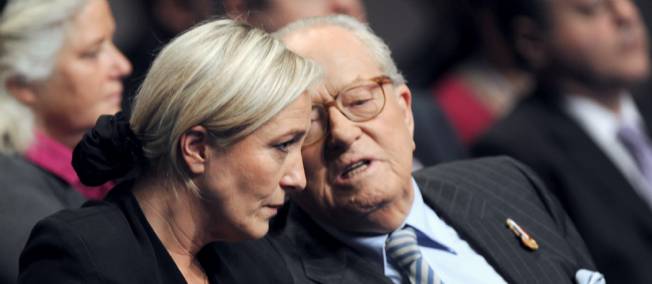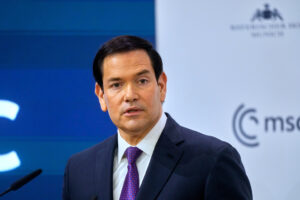France under Marine

Marine Le Pen and her father, Jean-Marie Le Pen. Picture by Alain Jocard | AFP

Arrogant. Snob. Elitist. These are three words that are often used to describe the French. Clearly negative, they do not have the same meaning however as “racist”, “anti-Semitic,” or “anti-European,” three words which are associated with the nationalist party in France, the Front National (FN).
The FN was founded in October 1972 by Jean-Marie Le Pen. Arguably due to his past in the Foreign Legion and because of traumatic foreign experiences in Vietnam and in Algeria, Le Pen’s rhetoric was initially based on xenophobia and anti-Semitism, claiming that the Nazi gas chambers were but a mere detail of history. But also anti-Europeanism. Among his many flaws, provocative and distasteful rhetoric are prominent.
Le Pen ran five times for president and lost each time. He almost reached l’Elysée, the official residence of the president, in 2002, when Jacques Chirac defeated him with an overwhelming majority during the second round of presidential elections. Never in France’s history has a president been elected with 82.2 percent of the vote. No matter how many supporters Chirac had in 2002, French people were not voting for him, but against Le Pen.
A few years later, Marine Le Pen, his youngest daughter, is now making headlines. Few are those who have not seen pictures of her piercing blue eyes and blonde hair aggressively smiling to the camera, in France and internationally.
Marine joined the FN in 1986. She was formerly a regional councilor, a member of the European Parliament and a municipal councilor. In 2012, she ran against Nicolas Sarkozy (Union du Mouvement Populaire/Union for a Popular Movement) and François Hollande (Parti Socialiste/Socialist Party). The FN became the third most voted party in the presidential race—17.9 percent of the electorate voted for her.
Before criticizing her, it is important to note that she has toned down the racist, anti-Semitic, neo-Nazi and pessimistic rhetoric her father has been preaching for the past forty-three years, clearly past his retirement age. That being said, Marine’s program for the 2016 elections is not a sight for the faint of heart.
Claiming to be the voice of the people and the spirit of France, Marine advocates for an end to the euro, creating a law that would make state purchases to French companies only compulsory, and a removal of stipends for elderly foreigners who haven’t worked or paid into France for at least ten years.
But more worrying is her anti-immigration policy. Marine Le Pen wants to reduce legal immigration in France from 200,000 to 10,000 people per year, a 95 percent decrease. Her official program of election claims that any person residing illegally in France will be expelled. She wants to remove jus soli or right of the soil as well as dual citizenship. Under Marine, “anti-French racism” as a purpose for crime will be considered an aggravating consequence and will therefore increase charges ensued; helping illegal migrants will be prohibited. As it is now, French citizens are allowed to help legalize an illegal migrant.
Marine’s rhetoric may be able to reach more people in France than her father’s due to its calmer and more universal approach, but this family’s story does not stop here.
Recently, the newspapers in France have been in frenzy over a political rift within the FN. As family drama goes, Jean-Marie Le Pen expressed his desire to run for the regional elections in Provence-Alpes-Cote-d’Azur (PACA). While Marine Le Pen has obviously been tirelessly working to “de-demonize” the party, she considered the resurgence of her father in elections as political suicide for her party and for her run in the presidential election in 2017.
Furthering the family feud was his granddaughter Marion Marechal-Le Pen’s nomination for the regional elections in PACA. Only twenty-five years old, she is one of the youngest members of parliament. Yet she rapidly rose to fame. She will likely be more dangerous than her aunt when the time comes, but that is not today. Just like her grandfather and her aunt after him, her strong character should allow her to remain on the political scene.
Much closer to her grandfather in terms of rhetoric and ideology than to her aunt Marine, Marion Marechal is known for her aggressive and strong character in Parliament. She called Manuel Valls, the French Prime Minister, a crétin, which could be translated as “imbecile,” in the National Assembly, an act clearly lacking tact and diplomacy.
The Le Pen family, and thus the Front National by extension, does not in the slightest represent the values of the French Republic. Let us not forget that the Marianne, the emblem of France, stands for “Liberty, Equality and Fraternity.” None of Marine Le Pen’s proposed reforms stand for these three words—particularly when it comes to her immigration policy, which is one of the platforms upon which she is most adamant.
Let us also not forget that France is very much a country welcoming of immigrants. How many Moroccans have been living in France for generations and now consider themselves French? How many East Asians have fled to France during times of political turmoil in their own homelands fifty years ago, only to open the only successful Asian restaurant in their neighborhood?
Recent statistics count 5.8 million immigrants in France—only 8.8 percent of the French population. And trends have changed over the past few years: there are now more immigrants from other European countries. In 2012, 46 percent of migration to France was from other countries in Europe.
Of course North African immigration is still present; 7 percent of the immigrants that came into France in 2012 coming from Morocco and another 7 percent from Algeria. This kind of integration however has some historical precedent. Morocco was considered a French protectorate from 1912 until 1956; while Algeria was a French colony from 1830 until the Evian Accords were signed in 1962, which marked the end of the war, and to that extent the end of French colonialism.
Marine’s anti-European policy is also un-French. France was among the forefathers of the European Union, with Germany, when the two created the European Coal and Steel Community in 1957, which was then replaced by the European Union with the Maastricht Treaty of 1992. No matter what critics say about the European Union and the Eurozone, it is still a project that was beneficial to many Europeans throughout Europe and it still is.
Because of the naturally tense political climate in France, usually pitting the incumbent Socialist Party against the Union for a Popular Movement (which Sarkozy wants to rename “The Republican Party”), the FN has been gaining traction, with more space to debate its rhetoric. The FN has also been using recent events and interpreting them in a way that advances its own arguments.
History repeats itself; and Marine might find herself in the same situation as her father in 2002, being sent to the second round because of the French people’s unhappiness with their current president. (On the most recent polling by TN-Sofres, 78 percent of those answering expressed their lack of confidence with Hollande’s actions while in power.)
Voting in someone from the FN could only mean that France is tired of political games between the two main parties and would prove unproductive (and dangerous) for the world we are living in today, in addition to misrepresenting France and its citizens.
Geraldine is an M.A. candidate in International Relations at New York University. She graduated with a BA from McGill University with a focus on International Development Studies and Political Science. Her main area of interest is Southeast Asia having grown up in Malaysia.




